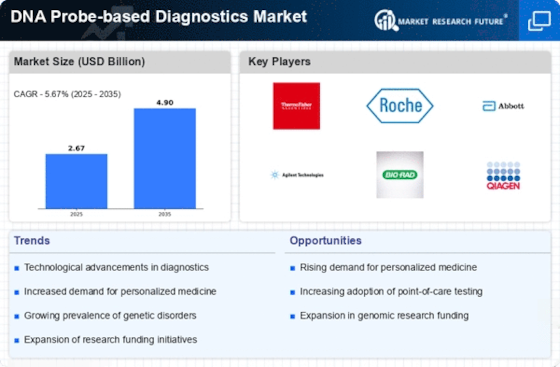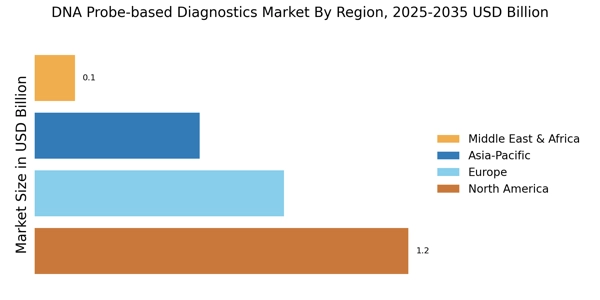Regulatory Support for Genetic Testing
Regulatory support for genetic testing is becoming an increasingly important driver for the DNA Probe-based Diagnostics Market. Governments and regulatory bodies are recognizing the value of genetic diagnostics in improving patient care and are implementing favorable policies to promote their use. This includes streamlined approval processes for new diagnostic tests and guidelines that encourage the integration of genetic testing into routine clinical practice. As a result, the market is likely to experience accelerated growth, with more diagnostic products receiving regulatory clearance. The establishment of clear regulatory frameworks is expected to foster innovation and investment in the DNA Probe-based Diagnostics Market, ultimately benefiting patients through enhanced access to advanced diagnostic solutions.
Rising Prevalence of Genetic Disorders
The increasing incidence of genetic disorders is a primary driver for the DNA Probe-based Diagnostics Market. As more individuals are diagnosed with conditions such as cystic fibrosis, sickle cell anemia, and various hereditary cancers, the demand for precise diagnostic tools rises. According to recent estimates, genetic disorders affect approximately 1 in 33 births, highlighting the urgent need for effective diagnostic solutions. This trend is likely to propel the market forward, as healthcare providers seek advanced technologies to facilitate early detection and treatment. Furthermore, the growing awareness among patients regarding genetic testing is expected to contribute to the expansion of the DNA Probe-based Diagnostics Market, as individuals become more proactive in managing their health.
Growing Demand for Point-of-Care Testing
The rising demand for point-of-care testing (POCT) is emerging as a significant driver for the DNA Probe-based Diagnostics Market. POCT offers rapid results, enabling timely clinical decisions, which is particularly vital in emergency and critical care settings. The convenience of conducting tests at the patient's location reduces the need for extensive laboratory infrastructure, making diagnostics more accessible. The market for POCT is expected to grow at a compound annual growth rate (CAGR) of over 10% in the coming years. This trend is likely to encourage the adoption of DNA probe-based technologies, as they can be effectively utilized in POCT applications. Consequently, the integration of these diagnostics into point-of-care settings is anticipated to enhance patient outcomes and drive market expansion.
Advancements in Molecular Biology Techniques
Innovations in molecular biology techniques are significantly influencing the DNA Probe-based Diagnostics Market. The development of next-generation sequencing (NGS) and polymerase chain reaction (PCR) technologies has enhanced the accuracy and efficiency of genetic testing. These advancements allow for the rapid identification of genetic mutations, which is crucial for timely diagnosis and treatment. The market for NGS alone is projected to reach USD 10 billion by 2026, indicating a robust growth trajectory. As these technologies become more accessible and cost-effective, healthcare providers are increasingly adopting DNA probe-based diagnostics, thereby driving market growth. The integration of these advanced techniques into clinical practice is likely to revolutionize the landscape of genetic diagnostics.
Increased Investment in Research and Development
The surge in investment in research and development (R&D) within the healthcare sector is a crucial driver for the DNA Probe-based Diagnostics Market. Pharmaceutical companies and biotechnology firms are allocating substantial resources to develop innovative diagnostic solutions. This focus on R&D is expected to yield novel DNA probe-based technologies that enhance diagnostic accuracy and efficiency. In recent years, funding for genetic research has seen a notable increase, with billions of dollars being invested annually. This influx of capital is likely to accelerate the development of advanced diagnostic tools, thereby expanding the DNA Probe-based Diagnostics Market. As new products emerge from R&D efforts, the market is poised for significant growth, driven by the introduction of cutting-edge technologies.

















